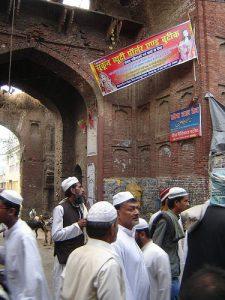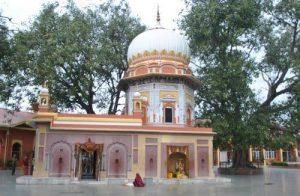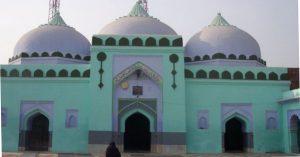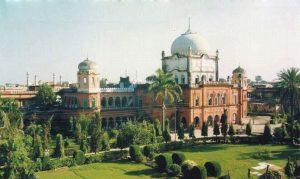Changing the Name of Deoband Will Not Have Any Impact on Darul-Uloom, Mr MLA
By Maulana Nadeem ul Wajidi
Deoband is on top of the list of towns and cities in western Uttar Pradesh known for their Muslim identity.
Situated in the north of country and at a distance of 147 km from the capital Delhi, Deoband simply became famous because of Darul-Uloom-Deoband that was established in 1866. Spanning over 150 years of history, the services rendered by this institution took this town not only to the heights of popularity but reverence as well.
Conquering all the geographical border restrictions this is the only institution of religious learning associating with which millions of Muslims around the world take great pride. This is simply not only a seminary or a university. Due to its close association with the message of the Prophet (PBUH), representation of moderate and correct interpretation of Islam in the light of Qur’an and Sunnah and due to its contribution in combining academic and practical fields within the perimeters of Islam it has earned the status of a school of thought.
The unrivalled fame and popularity of this town is and should be a cause of pride for all of its residents but unfortunately there are some elements that do not like the fact that the town is recognised for its association with Islam and Muslims. They want to change its name and replace it with something that can take away its Islamic identity and thus help make it emerge on the world map as an ancient centre of Hinduism.
One of the BJP candidate has won from here in the recent assembly elections. His victory is being interpreted as a huge historic win and has continued to be discussed on media to-date.
Because of Darul-Uloom-Deoband, the general perception had been that only or mostly Muslims lived in this town and if there were any non-Muslims then they were in a very tiny minority. Some of the media reports went as far as quoting that in Deoband Muslim population was more than 80 or 90%. Whoever said that then his knowledge about population was surely and extremely erroneous. If we talk about Deoband town itself, the ratio of its Muslim population there is between 60 and 65% and if we talk about the whole constituency for assembly election then it comes down to simply 38%. In a situation like this if residents [from other communities] get united, they can easily defeat a Muslim candidate here. And when two Muslim candidates are in fierce battle against each other then this defeat becomes foregone conclusion. This is what exactly happened in Deoband and as a result the BJP candidate won.
Because of Darul-Uloom-Deoband, the general perception had been that only or mostly Muslims lived in this town and if there were any non-Muslims then they were in a very tiny minority. Some of the media reports went as far as quoting that in Deoband Muslim population was more than 80 or 90%. Whoever said that then his knowledge about population was surely and extremely erroneous. If we talk about Deoband town itself, the ratio of its Muslim population there is between 60 and 65% and if we talk about the whole constituency for assembly election then it comes down to simply 38%. In a situation like this if residents [from other communities] get united, they can easily defeat a Muslim candidate here. And when two Muslim candidates are in fierce battle against each other then this defeat becomes foregone conclusion. This is what exactly happened in Deoband and as a result the BJP candidate won.

Since independence only two Muslim candidates have ever been able to succeed from this constituency: once during the Janata wave and second time in a mid-term poll. I do not think the victory of BJP’s candidate now should be seen from any other angle. This was a simple game of numbers in which one player has won and the other player got defeated because of division of votes.
There is no doubt that after its historic victory in UP, BJP’s spirits have risen up greatly. BJP fought this election against Muslims.This exemplary victory has provided BJP with an opportunity to do anything it wants to do to continue the storm of anti-Muslim sentiments it had raised.
BJP’s victorious candidate from our town Deoband has, in his first press conference, laid it clear the stand he is going to take now. He said that in the very first session of assembly he would table a resolution to change the name of the town. He claims that Deoband’s real name is ‘Dev Vrand’, hundreds of years ago this region used to be known with this name. Documentary evidence, he says, would be obtained and submitted in support of this claim. The debate supporting and opposing this view that had started following Kunwar Brijesh’ press conference is still going on. Many are trying to see this intention and resolve to rename Deoband in the context of Darul-Uloom-Deoband.
Deoband is an ancient inhabitation. Maulana Zulfiqar Ali Deobandi in his ‘Alhadiyatul Sunniah’ writes that “from the archaeological signs it looks that this locality belongs to the initial ages after the Great Deluge that happened during Noah’s Prophethood.’ The author of ‘Hindu Sanskiriti’ writes, ‘Deoband is mentioned in Puranas. It is popularly known that Deoband existed during the time of Koravs and Pandvas. Even during the prime time of Buddhism this locality was the centre of the campaign launched by Brahmins.’
On the southern outskirts of the town there is a mohalla (locality) known as Sarai Peerzadgan in which there used to be a well. On this well there was a plaque. The author of ‘Tareekh-e-Deoband’ Syed Mehmoob Rizvi tried to read this plaque but due to its age it had become unreadable. However, the date inscribed at the bottom gave some idea of the year that it was probably 119 Bikramajeet. Similarly another stone plaque was discovered from an old well that was assumed to belong to the period of Alexandra the Great.
From all the ancient historical records it appears that before the advent of Muslims there was only Hindu population here and it was considered as a holy place of the Hindus. A map of Maha Bharat, prepared by Munshi Shri Ram Mathur of Delhi, the translator of Mahabharat, gives an idea that the attack by Arjun on Jayadratha must have taken place from somewhere near Deoband and is said to have been from a place known as Rankhandi near Deoband (Rankahndi itself means warfront).

Muslims came to Deoband during the advent of Mahmood Ghaznavi, as described in ‘Tareekh-e-Saharanpur’ (History of Saharanpur). From the plaques on the graves of religious figures it appears that Muslims have been living here for about one thousand years. The oldest of these figures is Sheikh Mu’zil Islam. The Siddiqui Sheikhs descend from him. The date of his death on the plaque on his grave is 661 Hijrah (1262 AD).
There are many historical mosques in this town belonging to the period of Muslim reign. In close vicinity of Darul-Uloom-Deoband is Mohalla Diwan. Its magnificent and imposing gate still survives. This gate, built in the memory of Diwan Lutfullah Usmani who held the post of a Diwan during the reign of emperor Shah Jahan. This used to be a five-floor-high gate but three top floors having crumbled down only two remain reminding one of Shahjahan’s rule.

The author of ‘Tareekh-e-Deoband’ and ‘Tareekh-i-Darul-Uloom’ Syed Mahboob Rizvi writes about the name of Deoband that it used to be known as ‘Devi Bilas’ as there used to be a temple devoted to Sundri Devi known as ‘Devi Kund’ that survives even today while a forest known as ‘Bilas’ that used to be there has disappeared.
Some believe that Prophet Hazrat Suleiman (AS) had imprisoned the wicked demons (Deo) here that is why it is called Deoband and this is the name by which it has been referred to in Ain-e-Akbar as well.
In the autobiography of Hazrat Mujaddid Alif Saānī ‘Zubdatul Maqamat’, written in the beginning of 11th Century AD this locality has been mentioned as ‘Deban’.
In any case except the three names mentioned i.e. Devi Bilas, Deban and Deoband there is no mention of any fourth name of this town in history. Besides if Deoband is renamed as ‘Dev Vrand’ then this would be a completely new name.
In any case except the three names mentioned i.e. Devi Bilas, Deban and Deoband there is no mention of any fourth name of this town in history. Besides if Deoband is renamed as ‘Dev Vrand’ then this would be a completely new name.
With regard to the campaign to change the name of the town, let it be said that ‘Deoband’ was neither named by the Muslims; nor is it an Islamic name. On the contrary like Devi Bilas or Dev Vrand, this also reflects its origin in Hindu culture. If the sole purpose is to replace an Islamic name by a Hindu name then this is not going to serve the purpose being sought.
Those spearheading the name-change campaign should bear in mind that Darul-Uloom-Deoband has only added to the glory and fame of their historic town and has not harmed it in any way at all. Hindus and Muslims have been living here in harmony for centuries past.
The establishment of Darul-Uloom-Deoband has not promoted Hindu-Muslim unity in this town alone but has strengthened communal amity all over the country. The history of Darul-Uloom-Deoband is a testimony to this fact.
The participation of Darul-Uloom-Deoband in the freedom struggle should also be a matter of pride for all of our countrymen and not a matter of acrimony. Changing the name of the town will not harm the present or the future of Darul Uloom because Deoband has become a part of its name. If town’s name is changed Darul-Uloom-Deoband will still remain Darul-Uloom-Deoband. This will not become Darul Dev Rand, (Darul-uloom-Devban) or Darul-uloom-Devi-Bilas.
In my view, instead of indulging in such campaign our honourable MLA should concentrate on the development of the region and should work for Hindu-Muslim unity. This way he will be able to serve his town in a better way.
Translated by Urdu Media Monitor.Com from Daily Jadid Khabar, 24 March 2017
Urdu Media Monitor’s note: In addition to various ancient temples in Deoband, RadhaVallabh Temple is a testimony to the strong bond, mutual tolerance, understanding and communal amity between Hindus and Muslims that has developed and strengthened over centuries. Before Modi-Adityanath led hate-mongers force the authorities of this historic temple to remove this interesting story from its web for the interest of readers we produce it below:
Shri RadhaVallabh organization was founded by His Divine Grace Goswami Hit Harivansh Mahaprabhu. Shri vyas mishra, who was his father, was a Gaur Brahman of Devaband in Saharanpur region of Utter Pradesh. He was in service of the Mughul Emperor, Humayun.
As per Tarikh-I-Deoband (Syed Mehbub Rizvi, IImi-Marqaz, Deoband), Once when Shri Vyas Mishra was going with Mughal Emperor on his march from Agra, his better half Tara, gave birth to a child at the Royal Army Camp in Mathura. It was the eleventh day (Ekadashi) Monday of the Samvat 1530. Because the God had answered their prayers, they named their son Hari Vana, which means Hari’s issue.
The Emperor celebrated this event with magnificence, proclaiming the incarnation of holy flute of the Lord. Gulbadan Begum, sister of the Emperor, in “Humayaunnama”, a book written by her (which is kept in Gulistan Library at Tehran, capital of Iran) and Zauhar Aftabchi in his book “Tazkirat-ul-Wakiat” have depicted in detail that how for ten days there were abundant firecrackers, feasts, and celebrations. The Emperor, his Queen Mariam Makani, his sister Gulbadan Begum, and important courtiers like Beiram Khan, Tardi Beg, Yaqoob Beg, Dost Baba, Khoja Amber, and so forth had sent gifts and blessings to Pt. Vyas Mishra.
Gifts were distributed all around, from beggars to courtesans. One part of Royal procession was staying at Jamalpur Serai, which is on Agra-Delhi Road. Their celebrations, in the honor of Hit Harivansh Mahaprabhu, were carried on a big scale for ten days. It was directed and overseen by Abdul Majeed, who was the Dewan of Mathura. All the expenses were incurred by the royalty. The emperor had ordered everyone to avoid alcohol and non vegetarian during the celebration.
To mark the occasion, the Emperor requested that in future, Royal Armies would camp at FARAH instead of Baad.
Hit Harivansh Mahaprabhu passed his youth at Deoband. Once he was playing with his friends, and the ball fell in a well. Mahaprabhu went into the well to retrieve the ball and instead came out with a Shri Vigraha (Lord’s deity). This well still exists and Idol found was placed in his ancestral home, at Deoband broadly known as Shri Radha Navarangilalaji.
Once Hit Harivansh Mahaprabhu was sleeping under a peepal tree, Shri Radha gave her Holy “darshan” to him the in dream. She also gave him a “Mantra” (Holy couplet). This tree still exists around the temple at Deoband.

